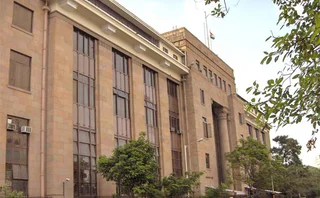
BoE allocates extra £50 billion for asset purchases
The Bank of England (BoE) will expand its asset purchase facility, or ‘quantitative easing’, by £50 billion to £175 billion, it said today.
The bank said that, while improvements were visible in credit conditions, market confidence and banks’ funding conditions, the recession in the UK “appears to have been deeper than previously thought”.
To make things worse, the bank also faces difficulty in achieving its 2% inflation target – June inflation fell to 1.8% from 2.2% in May. The slow trickle of government stimulus to the real economy, the past depreciation of sterling, and the need for banks to repair their balance sheets is likely to restrict the availability of credit, while falls in asset prices and high levels of debt may dampen spending, it said.
“While some recovery in output growth is in prospect, the margin of spare capacity [the difference between potential output and actual output] in the economy is likely to continue to grow for some while yet, bearing down on inflation in the medium term,” the bank said.
Therefore, “to keep inflation on track to meet the 2% inflation target over the medium term, the programme of asset purchases should be increased to a total of £175 billion,” bank governor Mervyn King announced.
The bank will extend the asset purchase facility to include all conventional gilts with a minimum residual maturity of more than three years. Also, the bank will add an extra auction every week. Auctions will be conducted on Tuesdays (for gilts with a maturity greater than 25 years), in addition to those already held on Mondays (10–25 years) and Wednesdays (three to 10 years).
Together with the UK Debt Management Office (DMO), the bank will also make a significant amount of the gilts purchased at auction available for on-lending to the market through the DMO’s repo market activity.
UK government bond yields fell on news of the expansion of quantitative easing. The yield on the 30-year gilt fell to 4.37% at 3.35pm BST today from 4.51% at close yesterday, while the yield on the 10-year gilt slid to 3.71% from 3.83%. Five-year yields fell to 2.92% from 3%.
The expansion of the programme will take three months to complete the bank said, adding that the scale of the programme would be kept under review.
Quantitative easing began on March 5, when the bank announced it would begin a programme of asset purchases worth £75 billion, financed by the issuance of central bank reserves, for monetary policy purposes. The reserves would also finance the purchase of medium- and long-term gilts in the secondary market, in effect boosting the supply of money in the system to meet the inflation target. On July 30, the Bank of England announced its intention to buy asset-backed commercial paper from struggling UK companies, starting on Monday August 3.
The bank also announced today that it will maintain its bank rate at 0.5%. The European Central Bank made a similar announcement, maintaining a bank rate of 1%.
See also: Bank of England to buy up commercial paper
Bank of England reveals £75 billion asset purchase programme
Only users who have a paid subscription or are part of a corporate subscription are able to print or copy content.
To access these options, along with all other subscription benefits, please contact info@risk.net or view our subscription options here: http://subscriptions.risk.net/subscribe
You are currently unable to print this content. Please contact info@risk.net to find out more.
You are currently unable to copy this content. Please contact info@risk.net to find out more.
Copyright Infopro Digital Limited. All rights reserved.
As outlined in our terms and conditions, https://www.infopro-digital.com/terms-and-conditions/subscriptions/ (point 2.4), printing is limited to a single copy.
If you would like to purchase additional rights please email info@risk.net
Copyright Infopro Digital Limited. All rights reserved.
You may share this content using our article tools. As outlined in our terms and conditions, https://www.infopro-digital.com/terms-and-conditions/subscriptions/ (clause 2.4), an Authorised User may only make one copy of the materials for their own personal use. You must also comply with the restrictions in clause 2.5.
If you would like to purchase additional rights please email info@risk.net
More on Financial stability
A regulatory storm hits China
Regulators are imposing a new wave of tighter financial supervision
Haldane dismisses talk of monetary and macro-prudential tensions
Bank of England’s Andrew Haldane says it is a virtue that different tools can be used to meet conflicting objectives
Central banks laying the seeds for crisis, says UK MP Baker
Chair of UK parliamentary group for economics says a sharp correction in developed world sovereign bond prices could spark a collapse in confidence
Q&A: Mark Branson on the too-big-to-fail problem, modelling and Basel III
Switzerland went first – and furthest – on post-crisis banking reforms, making its industry a test case for the impact of the new regime. But it has not yet solved the too-big-to-fail problem, Mark Branson, chief bank supervisor at Eidgenössische…
Risk Annual Summit: Depositors will trust EU guarantee despite Cyprus, says BdF official
Policy-makers have incentive to accelerate deposit guarantee plans, says Sylvie Matherat of the Banque de France
Risk Annual Summit: Banking union set for mid-2014, says ECB
National supervisors made “gigantic mistakes”, says ECB's financial stability head
RBI sees developing repo markets necessary in meeting Basel liquidity rules
India central bank views repo as an increasingly important market in the wake of Basel III implementation
ESRB narrows its macro-prudential tools
The European Systemic Risk Board is about to announce a slimmed-down list of potential macro-prudential tools, but who has the power to use them is still the subject of debate. By Michael Watt







